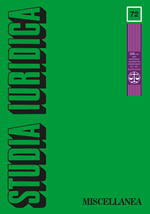Spory o wykładnię znamion przestępstwa kradzieży energii (art. 278 § 5 k.k.) – czy prawnicy znają fizykę?
The Disputes about the interpretation of the constituent elements of the offense known as “theft of electricity” (art. 278 § 5 k.k.) – Are lawyers familiar with the principles of physics?
Author(s): Tomasz TyburcySubject(s): Energy and Environmental Studies, Civil Law
Published by: Wydawnictwa Uniwersytetu Warszawskiego
Keywords: theft; theft of electricity; electricity; decriminalization; result of a criminal offence; kradzież; kradzież energii elektrycznej; energia elektryczna; kontrawencjonalizacja; skutek przestępstwa
Summary/Abstract: This article aims at analyzing the constituent elements of a criminal offense, based on Art. 278 § 5 k.k. The result of the analysis is the conclusion that in practice, only electricity can be the object of that offense. Therefore it must be specified accordingly in the provision of Art. 278 § 5 k.k. The study of literature led to the conclusion that the authors often mistakenly specify the object of that crime in a manner contrary to the principles of physics. This article presents the disputed issue of classifying the energy consumption by an entity authorized under an agreement with the provider, but with an understatement of the amounts of energy consumed by that entity. The author concluded that the classification of such act is possible based on Art. 278 § 5 and 286 § 1 k.k., depending on the definition of the result of an act which, at the time it was committed, was liable to evaluation under criminal law. The analysis also includes the controversial legal case of conscious use of energy consumed by the means of an illegal tapping into the power grid or causing a malfunction in a device designed to measure the amount of energy consumed by other persons who have not committed such an action. The study of literature led to the conclusion that according to the currently prevailing view such behavior does not fulfill the constituent elements of a crime. The author further concludes that due to the difficulties with the determination of the value of the object in question during the taking of evidence, the act of „stealing” electricity has rightly not undergone decriminalization; which could otherwise result in allegations on the grounds of infringement of the substantive law.
Journal: Studia Iuridica
- Issue Year: 2018
- Issue No: 72
- Page Range: 397-414
- Page Count: 18
- Language: Polish

